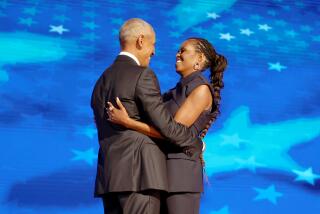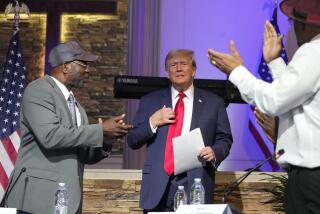President Obama hails NAACP’s centennial
- Share via
WASHINGTON — In his first address to civil rights leaders since his election, President Obama on Thursday marked the centennial of the NAACP by paying tribute to its history and calling on activists to tackle modern-day problems.
Obama told the organization’s members that only because of their forerunners could he stand before them as both an African American and president of the United States.
“I understand there may be a temptation among some to think that discrimination is no longer a problem in 2009,” Obama said. “But make no mistake: The pain of discrimination is still felt in America.”
Hundreds of people packed a hotel ballroom to hear Obama speak in New York, the city where the organization -- the standard-bearer of the civil rights movement and still the largest civil rights group in the nation -- was founded in February 1909.
The event was historic in its imagery alone: the first African American president at the lectern before an organization founded at a time when Southern lawmakers were codifying segregation and erecting barriers to the voting booth.
But while he marked the moment in history, Obama also looked ahead, asking members of the National Assn. for the Advancement of Colored People to turn their attention to the ongoing struggle for economic equality, not just for African Americans but for all people.
It was the first discourse on race that Obama has delivered in more than a year, since a roiling controversy over the minister of his home church in Chicago impelled him to clarify his views with a speech on race, politics and society in the spring of 2008.
In that address, Obama distanced himself from public statements of the Rev. Jeremiah A. Wright Jr., saying they expressed a “profoundly distorted view of this country” and caused division “at a time when we need unity.”
In that sense, the president’s speech Thursday was tautly in line with his established rhetoric on race. Obama noted that African Americans were more likely to be hit by unemployment, spiraling healthcare costs and AIDS, but noted that those challenges were not limited by racial boundaries.
The pain of inequality is felt by people everywhere, Obama said: “By African American women paid less for doing the same work as colleagues of a different color and gender. By Latinos made to feel unwelcome in their own country. By Muslim Americans viewed with suspicion for simply kneeling down to pray. By our gay brothers and sisters, still taunted, still attacked, still denied their rights.”
In a room of many black clergy leaders, the appeal for gay rights was not an easy applause line.
But Obama was preaching to the choir as he pitched his most pressing domestic policy goals, speaking in biblical terms of an economy “built not on a rock, but sand.” He asked for help in creating a more solid foundation, built on his healthcare, energy and financial reform proposals.
Echoing themes of his presidential campaign, Obama also urged black parents to take responsibility for their children and encourage them to aspire to great things.
Though marches and protests were the tools of yesteryear, Obama emphasized a different route to empowerment.
“That means putting away the Xbox and putting our kids to bed at a reasonable hour,” he said. “It means attending those parent-teacher conferences, reading to our kids and helping them with their homework.”
He said it also means looking after neighbors’ children and setting higher goals.
“They might think they’ve got a pretty good jump shot or a pretty good flow, but our kids can’t all aspire to be the next LeBron or Lil Wayne,” he said. “I want them aspiring to be scientists and engineers, doctors and teachers, not just ballers and rappers. I want them aspiring to be a Supreme Court justice. I want them aspiring to be president of the United States.”
Earlier, Obama spoke at a fundraiser for Gov. Jon Corzine of New Jersey, a fellow Democrat. The president was ferried in the Marine One helicopter Thursday by an all-female crew, in honor of the first woman to pilot the presidential aircraft, on her last day in that assignment.
As critics and even its own leaders debate the relevancy of the NAACP in the age of a black president, Obama suggested that the push for equality should be shared regardless of gender, race and orientation.
“If three civil rights workers in Mississippi -- black and white, Christian and Jew, city-born and country-bred -- could lay down their lives in freedom’s cause, I know we can come together to face down the challenges of our own time,” he said. “We can fix our schools, heal our sick and rescue our youth from violence and despair.”
--
More to Read
Sign up for Essential California
The most important California stories and recommendations in your inbox every morning.
You may occasionally receive promotional content from the Los Angeles Times.











